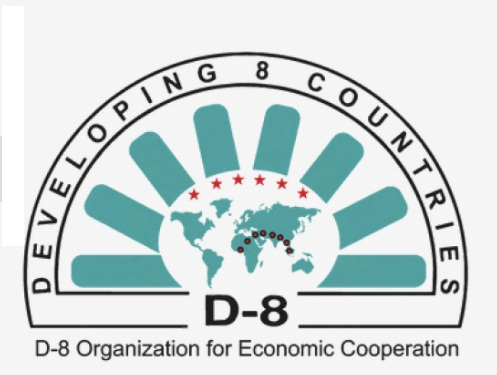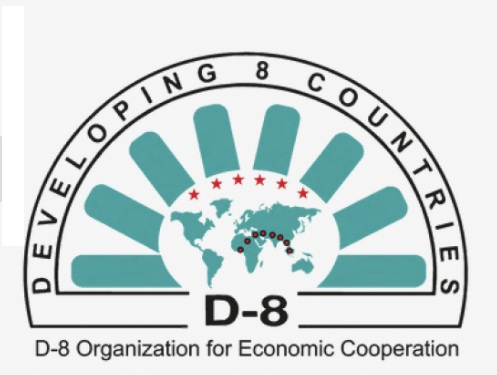
Islamic D-8: can this intergovernmental organization help stabilize Southwest Asia and North Africa?
Cairo will host the 11th edition of the D8 Summit on Thursday, 19-12-2024, which will discuss ways to confront successive global economic and political changes. The summit will be held under the slogan "Investing in Youth and Supporting Small and Medium Enterprises: Shaping Tomorrow's Economy."
Egypt chairs the current edition of the summit, having assumed the presidency of the group last May and will continue to lead its work until the end of next year.
Several summits and bilateral meetings are scheduled to be held on the sidelines of the D8 Summit in Cairo, whether at the level of presidents or delegations participating in the conference.
The meeting of the foreign ministers of the Islamic Republic of Iran, Turkey, Egypt, Pakistan, Indonesia, Nigeria, Malaysia, and Bangladesh will be held tomorrow, Wednesday.Several heads of state will be attending this summit this year, including Iran's president.
Iranian President Masoud Pezeshkian plans to attend the summit of the Developing Eight (D8) Islamic countries in Egypt on Thursday, Iranian Foreign Ministry spokesman Esmail Baghaei said Tuesday. This is the first visit by an Iranian president to Egypt in more than a decade.
Relations between Egypt and Iran have generally been tense in recent decades, but the two countries have intensified high-level diplomatic contacts since the Gaza war broke out last year, in which Egypt has tried to mediate. Iranian Foreign Minister Abbas Araqchi traveled to Egypt in October to discuss regional issues with Egyptian officials, and his Egyptian counterpart Badr Abdel Aty traveled to Tehran in July to attend Pezeshkian’s inauguration.
Indonesian president will attend D-8
Indonesian President Prabowo Subianto will travel to Egypt on Tuesday to attend meetings of a group of eight major Muslim nations known as the Developing Eight (D8) Economic Cooperation Organization, the government said.
Prabowo will attend meetings, including a D8 summit on Thursday, and accept the group’s chairmanship for a two-year term starting on Jan. 1, 2026, Foreign Ministry spokesman Roy Soemirat told reporters on Monday.
Turkish Foreign Minister Hakan Fidan will participate tomorrow, Wednesday, in the 21st meeting of the G8 Foreign Ministers Council, which will be held in the Egyptian capital, Cairo, within the framework of the D8 Summit.
According to diplomatic sources in the Turkish Foreign Ministry, the meeting will address developments in the Palestinian Gaza Strip and other regional issues.
During the meeting, Fidan is expected to call for an immediate end to the genocide committed by Israel in Palestine and its measures aimed at turning the war into a regional conflict.
He is also expected to point out the importance of advancing efforts to implement the two-state solution in conjunction with reaching an immediate ceasefire.
Fidan will highlight the importance of providing urgent humanitarian aid to Gaza and increasing support for the efforts of the workers of the United Nations Relief and Works Agency for Palestine Refugees (UNRWA).
The meeting of the Foreign Ministers Council comes within the framework of preparing for the summit hosted by Cairo next Thursday, with the participation of delegations from the group's countries: Turkey, Egypt, Nigeria, Pakistan, Iran, Indonesia, Malaysia and Bangladesh.
The summit is scheduled to be held under the theme “Investing in Youth and Supporting SMEs: Shaping Tomorrow’s Economy.”
Attendance of the D-8 Summit in Cairo
The Indonesian government announced that President Prabowo Subianto will travel to Egypt today, Tuesday, to attend the group's meetings and the upcoming summit next Thursday, and will accept the group's presidency for a year.
In addition, Iranian Foreign Ministry spokesman Esmail Baghaei announced that Iranian President Masoud Pezeshkian will participate in the G8 Summit in Egypt.
The Pakistani Embassy in Cairo also confirmed that Pakistani Prime Minister Shehbaz Sharif will pay an official visit to Egypt from December 18 to 20 to participate in the summit's activities.
President Abdel Fattah el-Sisi handed the Lebanese caretaker Prime Minister Najib Mikati an invitation to participate in the summit's activities, as the Lebanese Prime Minister received the invitation from the Egyptian Ambassador Alaa Moussa, during his reception on December 9 at the Grand Serail.
The Middle East Eye website also reported that Turkish President Recep Tayyip Erdogan will participate in the group's meeting and will hold meetings related to current developments in Syria.
About the D-8: the Developing Eight
The G8, also known as the Developing Eight, is a development cooperation system between the following member states: Bangladesh, Egypt, Indonesia, Iran, Malaysia, Nigeria, Pakistan, and Turkey. This system also adds a new dimension aimed at strengthening economic relations and social ties among its members.
The G8 was officially established at the Summit of Heads of State and Government held in Istanbul on June 15, 1997 (Istanbul Declaration), following the "Cooperation for Development" Conference held on October 22, 1996 and a series of preparatory meetings.
The G8 aims to:
Improving the position of developing countries in the global economy.
Creating new opportunities in trade relations.
Enhancing the participation of developing countries in international decision-making.
Achieving better living standards.
The most important features of the G8:
It is a global system, not a regional one, as is clearly evident in its founding members.
Its membership is open to other developing countries that share the objectives and principles of the Group and are linked by common ties with it.
It is a forum that has no adverse effect on the bilateral and international obligations of its member states towards its membership and towards international organizations.











































